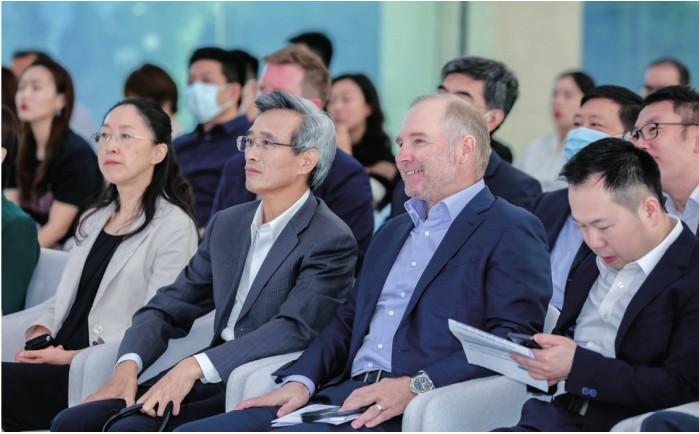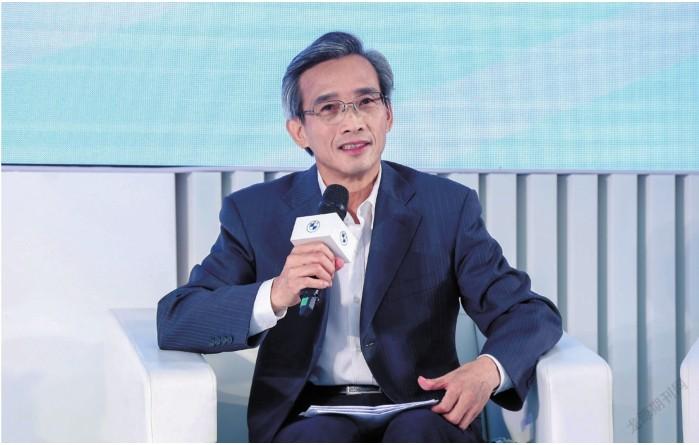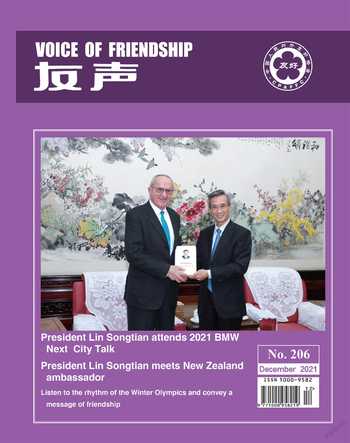CPAFFC President Lin Songtian attends 2021 BMW Next City Talk
2021-01-22ZhangJi
Zhang Ji
O n Sept 22, the first anniversary of President Xi Jinping’s declaration of China’s carbon peak and carbon neutrality goals, the CPAFFC, BMW and ThePaper co-hosted the 2021 BMW Next City Talk in Beijing.
CPAFFC President Lin Songtian attended the meeting and joined the opening discussion with Jochen Goller, president and CEO of BMW Group Region China, and Liu Yonggang, president of ThePaper. Five experts, including Tongji University VicePresident Lou Yongqi, made keynote speeches. Nearly 100 representatives from companies, universities and think tanks took part in the meeting, which included the debut of a digital handbook — 72 Strategies for A Low Carbon City — offering guidelines for a low-carbon city lifestyle. A live broadcast of the meeting was presented by ThePaper.
During the opening discussion, Lin noted the theme, “Urban Breath”, which focused on green, low-carbon development and met China’s new development concept and new development goals. BMW and other German companies have been China’s partners in its development, Lin said, adding that they have made positive contributions to China, realized their own growth and set a good example of mutually beneficial cooperation and common development.
In 2020, three major German automakers sold 5.4 million cars in China, accounting for 38.2 percent of their global sales and 20 percent of Germany’s total exports and creating nearly 1 million jobs.
In answering questions faced by the whole world, and in tackling practical challenges and threats to humanity, such as climate change, President Xi initiated the concept of building a human community with a shared future for mankind, contributed Chinese solutions and Chinese wisdom and pledged to the world that China will aim to have its CO2 emissions peak before 2030 and achieve carbon neutrality before 2060.
China has taken concrete steps in domestic and foreign policy to support Xi’s pledge, and it has won international recognition and support as it has made remarkable progress.

Lin said, China, Germany and Europe as a whole are major powers, markets and civilizations with highly intertwined interests and are inexorably headed for a shared future. China has become the largest trading partner of Germany and Europe and also their largest source of overseas investment. Chinese tourists comprise the major chunk of foreign visitors to Germany and Europe.
In 2020, trade volume between China and Europe stood at 586 billion euros. And the China-Europe Railway Express has become a strong link connecting Asia and Europe for mutual benefits. From January to August, trains have made more than 10,000 trips, an increase of 43 percent over the same period last year.
Lin said state-to-state relations are forged to serve the countries’ basic interests and enhance the welfare of their people. If the European Union loses its strategic independence and economic prosperity, the only thing left would be its reliance on a certain major power. China and Germany, as well as other European countries need to maintain and strengthen their strategic sensibilities, strategic independence and mutual trust and work together to promote the welfare of mankind. They should stay alert to avoid being led astray.
China and Europe have made joint efforts to sign the Paris climate agreement, playing a leading role in the world, Lin said. In April, leaders of China, France and Germany held a video summit and decided to build a green partnership between China and Europe. China is implementing a new development concept in all respects and adopting a green, low-carbon development mode.
Germany and Europe possess advanced technologies and experiences in green development. Both sides are so complementary that there is huge potential for future cooperation. The CPAFFC, Lin said, want to make even greater efforts to promote friendship between the people of China and those in Germany and Europe, promoting win-win cooperation and common development.

Goller said that sustainability poses a global challenge as we “share weal and woe”, as the Chinese have long said. He pledged BMW’s full support in China’s endeavor to build a low-carbon economy. The company has set sustainable development as its core strategic goal in China and will strike a balance between business success and decarbonization challenges through innovation and cooperation, he said.
Liu, of ThePaper, said carbon peaking and carbon neutrality are not only the goals of the country but also the responsibility of every citizen. ThePaper intends to play the role of a publisher, a supervisor, a practitioner and a matchmaker, he said, adding that it will cover more practices in technological and institutional innovation, follow more cases of reducing carbon emissions and call for more companies and individuals to pursue low-carbon development and lifestyles.
The BMW Next City Talk is a three-year program initiated by the CPAFFC, BMW and ThePaper that combines efforts of the government, business sector and media. It concentrates on issues concerning the sustainable development of Chinese cities and has become an innovative international mechanism.
The first BMW Next City Talk, with urban boundaries as its theme, was held in Shanghai and Munich in 2019. The second meeting, with a theme of urban regeneration, was held online.
杂志排行
Voice Of Friendship的其它文章
- The Seagulls of Salt Lake City:Helen Foster Snow and China
- Overseas students from Peking University visit Xinjiang
- Listen to the rhythm of the Winter Olympics and convey a message of friendship
- A review of exchanges between Baoji and ROK in 2021
- 2021 GD Youth Link:3rd Guangdong International Youth Sports Dialogue held in Guangzhou
- Pacific China Friendship Association members issue joint statement to the WHO opposing politicization and stigmatization in COVID-19 origin-tracing
